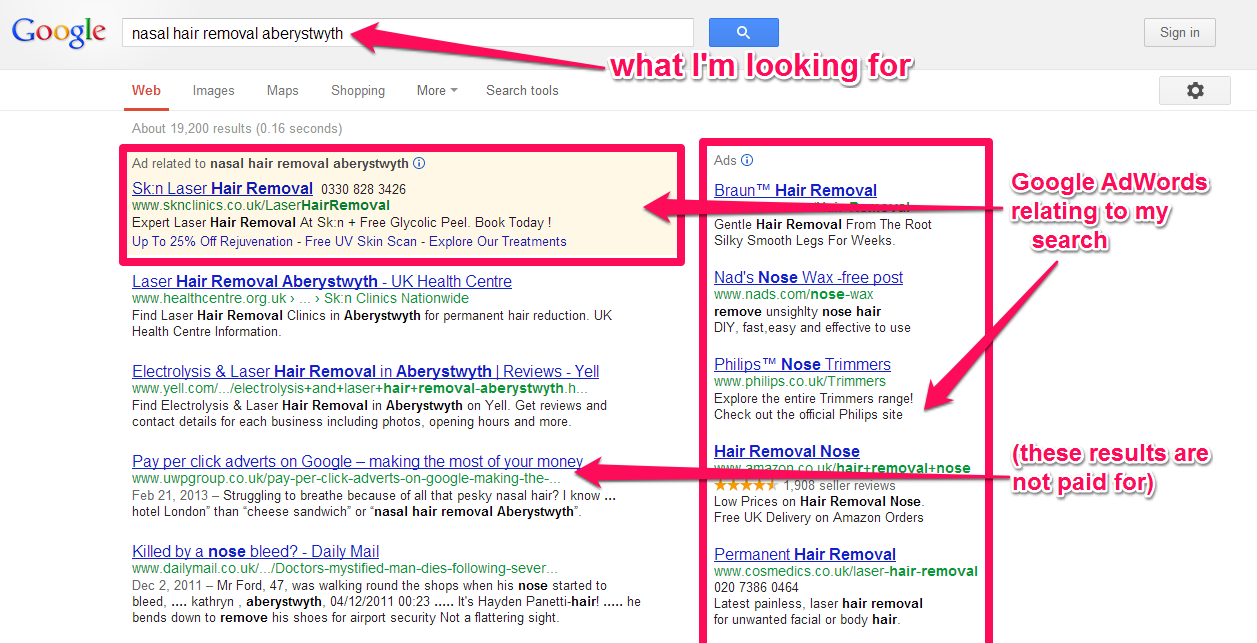They say the best things in life are free. They say a lot of things.
When was the last time you were given a free Rolls Royce or a free mansion in the country? A free holiday to the Caribbean or a free diamond ring? No? Didn’t think so.
Some things cost money. For a reason. Step forward Google AdWords.
There are two kinds of Google Ads – ads on the display network and ads on the search network. Display network ads are the ads Google puts on websites that it considers relevant to you. It might, for example, place an advert for your five-a-side football centre on a website aimed at football fans. Clever chap that Mr Google.
Search ads are the ones you see in yellow at the top – or on the right-hand side – of the page after you search for a certain term on Google.
In other words, by paying a search engine, companies can maximise the chances their adverts are given pride of place when a potential customer taps in something relevant.
If and when your ads are approved, you can decide on your budget and start and stop your campaign whenever you want – giving them as many tweaks as you like in the meantime.
You can ensure your ads appear at a specific time of day, throughout a specific location, on certain devices but not others – the world is your oyster.
Surprise surprise, the pay-per-click (PPC) method means you pay every time someone clicks on your ad. This is no guarantee of custom though: you need to seal the deal and convert those curious punters into paying customers.
It is therefore essential that your website is attractive and customers are directed through to the right pages so they have the best experience possible after clicking on your ad.
One added bonus is pay per click can tell you how effective your advertising is: it can give you an insight into which words are most relevant to the people you are trying to attract. If you snooze you lose so improve them – and the copy on your website – whenever possible.
Each click might cost you anything from a few pence to a few pounds. You won’t be surprised to learn it tends to cost more for phrases that are likely to result in visitors spending some serious cash.
Expect to pay more every time a potential customer clicks on “car insurance” or “luxury hotel London” than “cheese sandwich” or “nasal hair removal Aberystwyth”. For example.
Different ways to pay: Bid-based vs flat-rate pay per click
You have the option of taking the safe route and paying a flat rate every time someone clicks on one of your adverts.
Alternatively, you can enter into a blind auction with your rivals and bid for the prime positions on the page.
As you’d expect, the more you are willing to pay, the better the chances your ad will appear at the top of the pile – although quality is also a factor.
Basic ads display a headline, two lines of text and a web address. You can pay for a fraction more space but words are at a premium either way and there’s plenty to do so your copy needs to be sharp and relevant.
If most of your business is local you should bear this in mind when setting up your Adwords account.
If you own a karaoke bar in Plymouth then person A tapping in “karaoke bar Plymouth” is far more valuable to you than person B who has simply tapped in “karaoke bar” and could be hundreds of miles away.
In this instance then, you will almost certainly want to set your geographical filters to exclude people that are too far away – and there are other ways to sort the wheat from the chaff.
Negative keywords: Making sure your Google Ads target the right people
By giving a search engine a list of negative keywords you are telling it you don’t want to be shown on results pages for certain terms. This means your ad will get seen by fewer ‘wrong’ people.
Let’s say you are a men’s hairdressers. I’m guessing “haircuts” might well be a crucial search term for you. You’ve probably worked that one out all by yourself. Give yourself a pat on the back.
But not any old haircuts. You only cut men’s hair. I imagine you’d want to exclude everyone who also tapped in words like women’s, woman’s, ladies’, girls’ or female – not to mention any hairstyles that are specific to women. We could go on. And on.
The good news is you can learn and improve. And that’s the bottom line. For a big campaign just monitoring your adwords, seeing which ones work best, working out why and tweaking things accordingly can be a full-time job.
It’s a constant battle to stay on top of your rivals. Test, test and test again because minor changes to your ads can make a major difference to the amount of people you convert into paying customers. And that’s all that matters in the end.
Who knows? You might find that changing “receive some help for free” to “get some free advice” will make the world of difference. There’s only one way to find out.
This is just a taster. We’ll go into more detail in a later blog. In the meantime, drop us an email on hello@uwpgroup.co.uk to receive some help for free. Or should that be to get some free advice?

